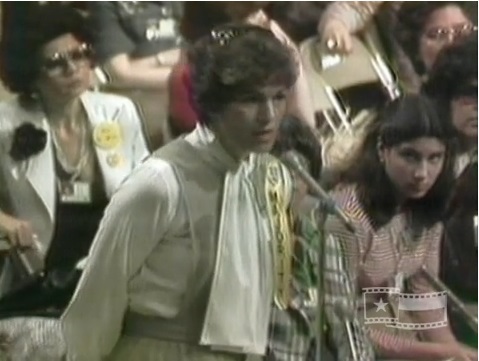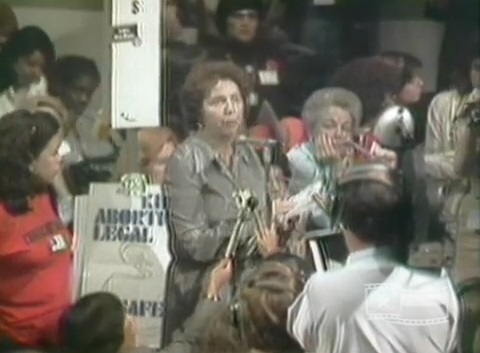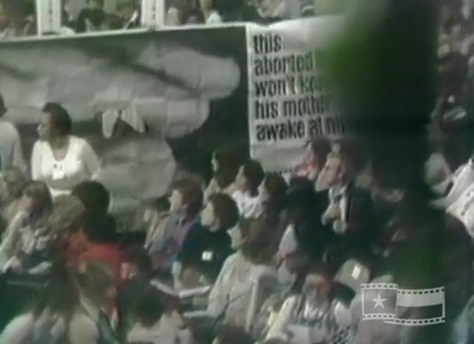In part one of this series on how NOW’s push for abortion (influenced by men) splintered the so-called “women’s movement” of the 1960’s, several prominent NOW leaders were ousted by the organization for refusal to buy into the pro-abortion, male-led agenda. Years after Roe v. Wade, that great divide, rather than resolve, continued to grow.
1977 Women’s Conference discriminates against opposition beliefs
In November of 1977, another National Women’s Conference, which should have included diverse opinions, was held in Houston. But just like the NOW convention in the 1960’s that introduced abortion, this 1977 conference also included a radical pro-abortion agenda. According to the National Archives, “around 20,000 people attended the Houston conference, including some 2,000 delegates who were sent to represent each state.”
The Texas State Historical Association points out that many of the resolutions presented at the national conference were passed at the Texas convention. That delegation was headed by known advocates of abortion, including Ann Richards, 45th governor of Texas (and mother of Cecile Richards, past president of Planned Parenthood), and Sarah Weddington, the attorney who argued the Roe v. Wade Supreme Court Case based on the lie that Norma McCorvey (“Roe”) had been raped.
On November 20, 1977, resolutions advocating abortion rights were approved by the delegates of the convention. According to records at the State of Maryland, many “opposed feminist political initiatives like increasing access to birth control and abortion services.”

Pro-life delegate Ann O’Donnell opposed 1977 Women’s conference abortion resolution
Just after pro-abortion feminist Caridee Wheeler proposed the resolution to support the Supreme Court’s Roe v. Wade decision, Ann O’Donnell, who chaired the Missouri delegation, objected by calling it the “the antithesis of the feminist women’s movement to oppress the less powerful.”
“It therefore has to be absolutely ridiculous for people who call themselves feminists to suggest that they kill their unborn children to solve their social problems,” she said. “The promise of the women’s movement will absolutely be destroyed if you go on record in favor of this destructive resolution,” she added, according to a November 21, 1977 Colorado Springs Gazette report of the conference.
The Washington Post reported that O’Donell stated that feminists, by supporting abortion, were advocating “worse oppression than the men oppressing them.”
More women rose to the floor to object. “The Reproductive Freedom resolution as stated in the plan book asks for a continuance of this policy. Abortion on demand is an abuse of another minority in this country: the unborn children,” stated the delegate show in the image below.

Prolife women object to abortion resolution at 1977 Women’s conference
READ: China’s One-Child policy ‘intelligent,’ said past National Organization for Women prez
As the gavel adopting the abortion resolution came down, pro-life women rushed to the front, carrying a large banner reading, “This aborted baby won’t keep his mother awake at night.”
In her book, Divided We Stand, author Marjorie J. Spruill recounts how pro-life delegates were “visibly distressed.” Spruill writes, “One of them, shaking and weeping, cried….”
A report of the vote recorded by the New York Times read:
The debate and aftermath of the reproductive freedom resolution – a plank supporting government funding for abortion as well as sex education – was more emotional. When the cheers went up for those who had voted yes, some women who had opposed the resolution rushed to the stage with a blown up photograph of an aborted fetus. Many of those women sobbed and shouted, “All we are saying, is give life a chance.”
Those in favor of the resolution chanted, “Choice.”
But the photograph of the “aborted fetus,” as the New York Times described it, was not the image one would expect. It portrayed the tiny feet of an aborted 10-week-old child, and is best known in pro-life circles as “Precious Feet.” The story behind this iconic photo can be found here.

Pro-life women object to abortion resolution carry banner of 10 week aborted baby at 1977 Women’s conference in Houston
No dissent allowed
Reports indicated that prior to the abortion resolution, many of the women had been united. Joan Gubbins, a Conservative who headed the Indiana delegation, contended that the resolution had been “shamelessly railroaded through.”
Pro-family delegates also complained that Parliamentarians had denied them debate.
A report by the Wisconsin State Journal a month later emphasized that the views of pro-life women were disregarded.
“The National Women’s Conference in Houston didn’t succeed as it should have because the participants acted too much like men…. Dissent was effectively shut off through parliamentary power plays, not usually considered typical female tactics,” the paper claimed Ann O’Donnell told them.
“They didn’t want to include anyone who doesn’t agree with their goals. If you want to join, you have to buy the whole package,” O’Donnell, who operated a home for pregnant women so they would not feel forced to abort, added.
She claimed that pro-life women were demonized as “uptight moralistic freaks from another century.”
“In Houston, they celebrated abortion. You don’t celebrate something like that,” O’Donnell said. “Can we really use an argument as flippant as, ‘Women have the right to control their own bodies?’ Can we use something as dangerous as, ‘This child isn’t wanted?’”
In part three, we will reveal how a large number of pro-life women rose up in opposition.
“Like” Live Action News on Facebook for more pro-life news and commentary!
The post Years after Roe, dissension among feminists over abortion kept growing appeared first on Live Action News.
Go to Source
Author: Carole Novielli




